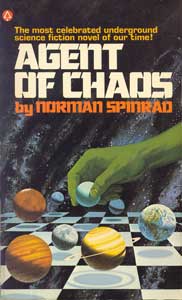Worlds of the Imperium - Keith Laumer
 I received a recommendation for Keith Laumer's Imperium novels, and so I decided to follow up on it. There's a new omnibus edition collecting all three Imperium novels, but it's currently only available in hardcover. Since this is my first encounter with Laumer's writing, I opted for the cheap way and bought a slightly beat-up used copy of the first book in the series for about two bucks and gave it a try.
I received a recommendation for Keith Laumer's Imperium novels, and so I decided to follow up on it. There's a new omnibus edition collecting all three Imperium novels, but it's currently only available in hardcover. Since this is my first encounter with Laumer's writing, I opted for the cheap way and bought a slightly beat-up used copy of the first book in the series for about two bucks and gave it a try.Laumer's hero, Brion Bayard, is an American diplomat from our world who is kidnapped and dragged into a parallel dimension by the Imperium. The basic idea is that there are many parallel universes that all differ from their neighbors by some tiny amounts. The Imperium is made up of many of these parallel Earths who are so close in continuity that traveling between them is easy and government and commerce flourish. Separated by an expansive barrens (parallel universes that failed in an evolutionary sense) is our universe, and one other. This other, "evil" universe is like ours, except the cold war escalated and modern civilization collapsed. Brion's counterpart in this universe is the supreme dictator of Earth, so the Imperium, fearing invasion by this "evil" universe, wants Brion to infiltrate the capital, kill his counterpart, and assume control of the government.
It's a pretty clever idea, except Laumer's writing is too sparse. The elaborate concept works solely to get Brion to his adventure on the "evil" Earth. The Imperium itself hardly appears at all in the story. Brion, though he is professionally a diplomat, is more of an action hero and never exhibits any of the tact or strategy one would expect. Laumer also made his most famous hero, Retief, a diplomat, so clearly he likes the idea, but for all purposes, Brion could have been a fireman or an accountant for all it mattered in this story. The depiction of the underground resistance on the "evil" Earth is particularly effective, as well as the intriguing twist Laumer injects into his story when Brion finally meets his counterpart. However, most of the book is written in a hurried style that never lingers too long on any one idea or character. It's not a bad book, just an unsophisticated one.
My copy includes two bonus short stories, unrelated to Imperium. "The War against the Yukks" is dreadful. It's the kind of chauvinistic junk that was common during the male-oriented bad-old-days of science fiction. Two idiots find an archaeological relic which turns out to be a spaceship and travel to a planet with 700 nubile women where they are given the arduous duty repopulating the whole planet. Ugh.
Much better is "Worldmaster" in which the admiral of the U.S.'s space fleet, as controller of the most powerful military force in the solar system, has decided to turn his military power back on the Earth and declare himself supreme dictator. The story's protagonist must take information of the coup to the president who may be able to stop the plot. The story is nothing more than an extended chase scene through a futuristic Washington D.C., but it was tight and quite enjoyable. I mention it because I enjoyed this one quote, which I find as applicable in today's political climate as it was in the 60s when Laumer wrote it. "Theories are beautiful things–simple and precise as cut glass–as long as they're only theories. When you find in your hand the power to make them come true...suddenly, it's not so simple."


